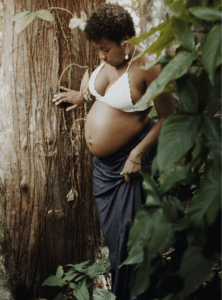We Need Climate Solutions that Prioritize Black Births
The recent winter storm, Uri, ravaged the southern U.S. leaving many families huddled together in a desperate search for warmth, electricity and potable water. In Texas, Uri left over 4 million people without electricity and clean water for nearly two weeks. Residents of Jackson, Mississippi remain under a boil water advisory four weeks later. As millions of people struggle with Uri’s aftermath, communities of color continue to bear disproportionate risk. This isn’t surprising; climate change is, at its foundation, a racial equity issue. According to Dr. Beverly Wright, environmental justice expert and founder of the Deep South Center for Environmental Justice, communities of color are more likely to breathe in polluted air, live near coal plants, and toxic sites and have a history of being neglected by the government in relief plans. A Human Rights Watch review of heat emergency plans for major American cities like Washington D.C., New York City, Philadelphia, Chicago, Austin, Nashville, Boston and Baltimore found no mention of pregnant people. Pets were more likely to be mentioned as a special vulnerable population than pregnant people!


The sequelae of climate change, including the need for safe, toxin-free drinking water, rising temperatures, and disaster relief planning, acutely affect Black birthing people. Globally, women of the African diaspora have fewer resources during climate crises, including drought, flooding, heat waves, the impact from hurricanes and storms. Studies show an association between the exposure to high temperatures and adverse birth outcomes, that include preterm birth and low birth weight. Additionally, for pregnant and parenting families, the lack of clean water in homes can cause poor health outcomes; pregnant people have increased water intake requirements, and infants who are formula fed require clean water to simply sustain life. These needs are often not included in heat and emergency preparedness plans.
Without centering the needs of Black women and birthing people, climate change advocacy risks perpetuating the harms of white supremacy and gender oppression. But Black women are already mobilizing to fill the gaps. The Black Maternal Health Momnibus Act of 2021, introduced by Congresswoman Lauren Underwood, Congresswoman Alma Adams, Senator Cory Booker, and members of the Black Maternal Health Caucus, aims to “invest in community-based initiatives to reduce levels of and exposure to climate change-related risks for moms and babies.” The Protecting Moms and Babies Against Climate Change Act is an important first step in safeguarding Black births from the deleterious health impacts of environmental racism and climate change.
The Reproductive Justice community and birth equity advocates continue to hold government and academic policy and decision-makers accountable for investing in Black women and birthing people whose interests are purposely left behind. Protecting Black birthing people from the catastrophes of climate change must include:
- Safeguarding against heat exposure for birthing people, at home and at work
- Investing millions in NIH and CMS-funded research on impacts of environmental exposures and climate change on birth outcomes within communities of color
- Requiring all government-sponsored climate change research proposals include investments in citizen science and community-centered partnerships
- Requiring FEMA to create targeted strategies for pregnant and postpartum families within emergency preparedness and weather-related disaster plans
Climate change and the lack of emergency preparedness desecrate the sanctity of Black births, the building blocks for our communities. But anything man-made can be undone. Our only hope for shielding our future generations is centering the most marginalized, minoritized and invisibilized communities. Black moms, birthing people and babies don’t deserve anything less.
Kelly Davis, MPA, is the Vice President, Global Birth Equity & Innovation and Tracey Estriplet, MPH, is the Program Associate at the National Birth Equity Collaborative.
[…] with others, two leading Black reproductive justice organizations, the National Birth Equity Collaborative, and the Black Women’s Health Imperative, are advocating for action. The Center for American […]
[…] com outras, duas importantes organizações negras de justiça reprodutiva, a National Birth Equity Collaborative, e as Imperativo de saúde da mulher negra, estão defendendo a ação. O Center for American […]
[…] with others, two leading Black reproductive justice organizations, the National Birth Equity Collaborative, and the Black Women’s Health Imperative, are advocating for action. The Center for American […]